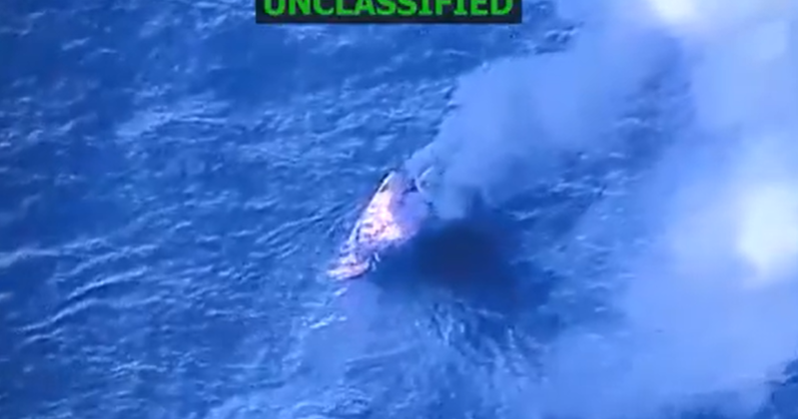
Washington — Senate Democrats plan to force a vote under the War Powers Act on Wednesday aimed at blocking continued U.S. strikes on alleged drug-carrying boats off the coast of Venezuela.
The resolution, led by Sens. Adam Schiff of California and Tim Kaine of Virginia, would block the U.S. military from engaging in hostilities with “any non-state organization engaged in the promotion, trafficking, and distribution of illegal drugs and other related activities” without congressional authorization.
“There has been no authorization to use force by Congress in this way,” Schiff said Wednesday, saying the strikes risk escalating into a full-blown conflict with Venezuela. “I feel it is plainly unconstitutional.”
The strikes in the Caribbean Sea have prompted bipartisan backlash, with lawmakers questioning their legality. Congress, which has the sole authority under the Constitution to declare war, has not authorized the use of military force against drug cartels.
The Trump administration says it has conducted four strikes on alleged drug-trafficking boats near Venezuela since Sept. 2, killing at least 21 people.
In a notification to Congress after the second strike in mid-September, the Trump administration said the U.S. is in a “non-international armed conflict” with drug cartels it has designated as terrorist organizations. The drugs smuggled by these cartels kill tens of thousands of Americans each year and constitute an “armed attack” against U.S. citizens, according to the White House.
The Trump administration has designated several drug cartels and gangs as terrorist organizations, including Venezuela’s Tren de Aragua, Mexico’s Sinaloa Cartel and El Salvador’s MS-13.
Secretary of State Marco Rubio, who was at the Capitol on Wednesday to meet with Senate Republicans, told reporters the president has the authority to order the strikes without congressional authorization.
“These are targeted strikes against imminent threats against the United States,” he said.
Regarding claims that the U.S. is acting in self-defense, David Janovsky, the acting director of The Constitution Project, said, “The situation in the Caribbean is not that.”
Democrats’ war powers resolution said the designation of drug cartels as foreign terrorist organizations “provides no legal authority for the president to use force against members of designated organizations or any foreign state.”
Kaine said the administration has not provided answers to lawmakers’ questions on the intelligence supporting the strikes, the legal rationale for them or why the decision was made to attack the boats instead of intercept them.
“The White House does not maintain there’s any congressional authorization,” Kaine said. “These military actions should stop unless authorized by Congress — not stopped, period, permanently, forever, can’t-do-them stopped — unless authorized by congressional action.”
Under the War Powers Resolution of 1973, the president is required to consult Congress before introducing armed forces into hostilities, unless there has been a declaration of war or other congressional authorization. If Congress does not authorize military force, the president has to withdraw forces within 90 days. The law was enacted in response to the Vietnam War as a check on the president’s power to wage war without the consent of Congress.
Republican Sen. Rand Paul of Kentucky has been the loudest GOP critic of the strikes on the alleged drug smuggling boats. After the first strike, Paul condemned Vice President JD Vance, who said “killing cartel members who poison our fellow citizens is the highest and best use of our military.”
“What a despicable and thoughtless sentiment it is to glorify killing someone without a trial,” Paul wrote.
Paul later underscored his point to reporters, saying the strikes risk killing innocent people, and there was no evidence the boat was headed to the U.S. He noted that the U.S. never boarded the boat to search for drugs before bombing it.
“I don’t care whether it’s a Republican president or Democrat president, I think we can’t just wantonly kill people without having some kind of process,” he said.
There were similar efforts by Congress over the summer to reassert its authority to declare war as tensions boiled over between Israel and Iran. The U.S. became directly involved in the 12-day war by bombing Iran’s nuclear facilities before Iran and Israel agreed to a ceasefire.
After the Iran strikes, the Senate voted down a measure that Kaine had introduced in the days before the bombings to block President Trump from using further military force against Iran.
“The Iran situation was extremely time-limited,” Janovsky said. “The administration has made it very clear that they continue, and have in fact continued, to carry out these strikes in the Caribbean. So I think that certainly creates more ongoing urgency for Congress to act in some way in this case.”
Schiff said Congress has abdicated its war-declaring responsibilities because members don’t want to go on the record on the issue. He said that sets a dangerous precedent.
“We’re blowing up ships thousands of miles from our shore,” Schiff said. “What is to stop some other nation from deciding, well, they’re going to use the same precedent to blow up ships thousands of miles from their shore, whether in the South China Sea or elsewhere, with a purported rationale that they’re engaged in some kind of trafficking and therefore they’re taking action? I don’t think this is a practice we want to see other nations adopt.”
